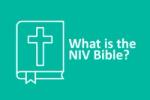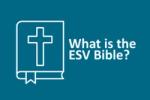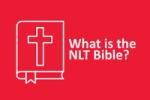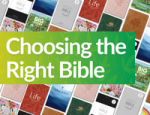3 Reasons People Don’t Read the Bible
Aaron Lewendon - Category Manager
.jpg)
We are currently in a strange situation. Bible sales are up, but the number of people reading the Bible is going down. Even stranger, this situation is nothing new. There has always been a difference between the number of people who own a Bible and the number of people who regularly read their Bibles.
Why is that?
How come so many people own Bible's but don't read them?
Here are three of the most common reasons why people don't read the Bible and why they don't really hold up.
3 reasons why people don’t read the Bible (and why they’re wrong):
1. It’s Too Old
One of the big reasons why people don’t read the bible is based on a false equivalence: the Bible is old, therefore it is hard to read.
Yeah, that is not the case at all. If we were all expected to read the original manuscripts and nothing else, then I would definitely agree. Asking someone to learn to read in Aramaic and Ancient Greek before they can read the Bible is what kept it out of the hands of the wider classes for literal centuries. It took a new translation in a new language to break that barrier.
But today, there are dozens of Bible translations available to suit every kind of reader. The Message Bible and The Passion Translation both tell the story of the Bible in a wholly contemporary language. The words you and I use on any given day. Even the more popular, middle-of-the-road translations are presented in a simple, digestible version of the English language. Bibles like the New International Version have been read all around the world owing to how simple the text is.
Yes, the original texts are old, but the translations of Bibles available today are far from it.
2. It’s Out of Date
Another argument against reading the Bible is that it’s out of date. Whilst I can’t argue that the social and political climate of today is at all similar to the settings of the Bible, not reading something because you either don’t agree with it or feel it is out of date is an incredibly limiting viewpoint.
Think of every book ever written that has been called “great”. Chances are you will be looking back through time to the books that laid the foundations for the world today. The "classics". Or, at least, you’ll remember those High School English classes where you had to stand up and recite lines from Romeo & Juliet. The books that got us where we are today came from a different time and a different climate, but without them we would be in a different world entirely.
Just because the book is a product and expression of a different time doesn’t mean they are out of date. The same goes for the Bible.
In Western Society, the Bible laid the groundwork for how we think, the laws we live by and a number of phrases and ideas that are still in use to this day, including turning the other cheek, pearls before swine, and moving mountains.
Yes, the Bible comes from a different time and place, but it is in no way out of date.
3. I Don’t Know How
The one thing everyone knows about the Bible is that it’s big. Coupled with the Bible’s age, this can make reading the Bible for the first time somewhat intimidating. To anyone feeling this, you are far from alone. People who have read the Bible all their lives still find it challenging and a lot to take in. But what they do know is where to turn to for help.
There are loads of great books that help you to read the Bible. If you are a first-timer, then check out these Bible introductions.
But for wondering where to literally start reading the Bible, here are three great places to begin:
The Gospel of John: A little bit of everything is in the Gospel of John. It tells the story of Jesus’ life, death and resurrection, but frames it with knowledge of the whole Bible and some of its bigger themes. John gets straight to the heart of what the Bible is all about.
The Gospel of Matthew: The first of all the Gospels, Matthew features a range of memorable stories both about Jesus and by Jesus - also known as the parables. It's a great introduction to the Bible through simple stories and messages that focus on the events of Jesus' life.
The Book of Genesis: Begin at the beginning with Genesis, which tells the story of creation and the early years of the world. Genesis also features some of the most famous stories from the Bible, such as Noah’s Ark and Joseph’s colourful coat. Following on from Genesis is Exodus, which tells the story of the birth of the Israelites and their escape from Egypt.
To help you understand more from the Bible, there are plenty of Bible study guides that put each book in its wider context and helps you understand what the authors are saying.
No matter where you are coming from, there is help out there to help you know how to read the Bible.
Reading the Bible helps you in countless different ways. If you are feeling inspired to give it a try but don’t have a Bible of your own, we’ve put together a guide to choosing the right Bible.
Latest Blogs

Bible
What is the New International Version (NIV) Bible?
Finding the right Bible isn’t easy. There are dozens of translations and hundreds of editions to choose from. Our new series of guides is here to answer your questions about the different Bibles on offer today.

Bible
What is the English Standard Version (ESV) Bible?
Finding the right Bible isn’t easy. There are dozens of translations and hundreds of editions to choose from. Our new series of guides is here to answer your questions about the different Bibles on offer today.

Featured
What is the King James Version (KJV) Bible?
Finding the right Bible isn’t easy. There are dozens of translations and hundreds of editions to choose from. Our new series of guides is here to answer your questions about the different Bibles on offer today.

Featured
What is the New Living Translation (NLT) Bible?
Finding the right Bible isn’t easy. There are dozens of translations and hundreds of editions to choose from. Our new series of guides is here to answer your questions about the different Bibles on offer today.

Bible
Choosing The Right Bible
With more than 20 English Language translations each available in 25 or more different editions the choice of Bibles excites and bewilders. Choosing the right Bible for you is important - even if you already have more than one.

Spiritual Growth
LENT COURSES - How to choose the right one for you
Long overshadowed by the celebrations of Easter Sunday, Lent is being rediscovered as a sacred time of reflection and renewal in its own right and a time of preparation for the joyous seasonal finale.
